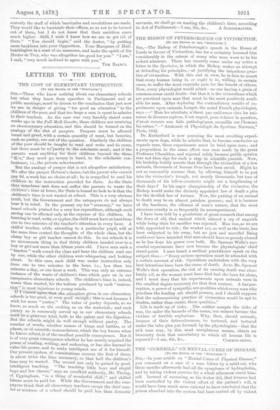THE BISHOP OF PETERBOROUGH ON VIVISECTION.
rEo THE EDITOR OE THE "SPECTATOR.'] SIII,—The Bishop of Peterborough's speech in the House of Lords in favour of Vivisection, has for a certainty lessened him considerably in the esteem of many who were wont to be his ardent admirers. There has recently come under my notice a letter in the Spectator, in which the Bishop makes an attempt at defending his principles,—at justifying the iniquitous prac- tice of vivisection. With this end in view, he is fain to assert that every human being is, or ought to he, willing, in certain cases, to suffer the most exquisite pain for the benefit of others. Now, every physiologist would admit—no one having a grain of common-sense could doubt—but that it is the vivisoctions which are practised upon man that must be the most positively avail- able for man. After deploring the contradictory results of ex- periments upon animals, Longet, the noted French physiologist, says :—" Mais les rosultats, u'dtant pas uniformes chez lea ani- maux de diverses especes, il est urgent, pour 6clairer la question,
d'avoir recours aux faits pathologiques, recueillis Bur l'homme lui-meme."—" Anatomic et Physiologic) du Systeme Nerveux," Paris, 1842.
Dr. Rutherford is now pursuing the most revolting experi- ments upon dogs, while he admits that, to become conclusive as regards man, these experiments must be tried upon man ; and a proposition to the same effect was once made by the great Professor Cheselden, and rejected solely because public opinion was not then ripe for such a step in scientific pursuit. Now, his lordship boldly asserts that through the vivisection of a few animals, thousands of human lives have been saved. Might he not as reasonably assume that, by allowing himself to be put into the vivisector's trough, not merely thousands, but tens of thousands of his fellow-creatures might see a lengthening of their days P In his eager championship of the vivisector, the Bishop would make the divinely appointed law of death a plea for the devilish law of torture. Now, the putting of an animal to death may be an almost painless process ; and it is because of the hardness, the vileness of man's nature, that the most atrocious cruelty is so frequently its accompaniment.
I have been told by a gentleman of great research that among the Iowa of old, that animal which uttered a cry of anguish while being slain for sacrifice was rejected. Man was, as we are told, appointed to rule ; the weaket sex, as well as the brute, has been subjected to his sway, but no just and merciful Being could ever have intended that man should have so grossly abused as he has done his power over both. Mr. Spencer Wells's suc- cessful experiments have now become the physiologists' chief stand-point. I once heard a medical practitioner speak on the subject thus :—" Every serious operation must be attended with a certain amount of risk. Operations undertaken with the very best intentions have been the cause of death. As to Mr. Spencer Wells's first operation, the risk of its causing death was abso- lutely nil, as the woman must have died had she been let alone, and I must deny that his experiments upon animals were in the smallest degree necessary for that first venture. A fine per- ception, a power of sympathy, are qualities which every man who practises the healing art should possess, and I should suppose that the unhumanisiug practice of vivisection would be apt to deaden, rather than create, these qualities."
Life is made up of risks. The soldier accepts the risks of war, the sailor the hazards of the ocean, our miners become the victims of terrible explosions. Why, then, should animals, because of their defencelessness, be tortured, and tortured under the false plea put forward by the physiologists—that the sick man may, by this most unrighteous means, obtain an immunity from that uncertainty to which all human life is


































 Previous page
Previous page